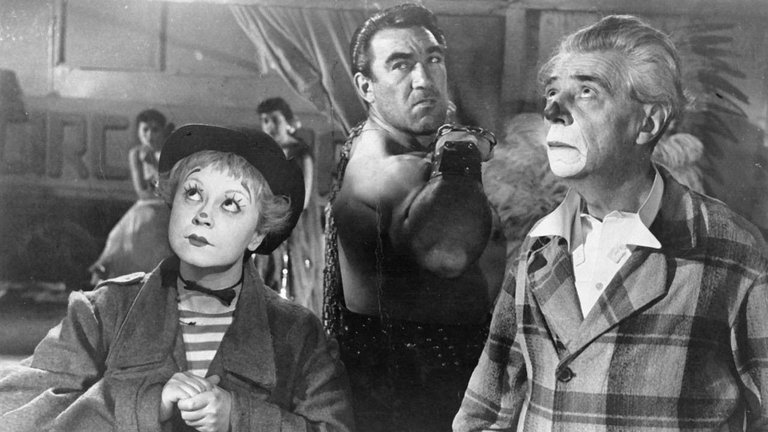
The power of cinema as an art form cannot be underestimated, as it has the ability to inspire both greatness and extreme actions. This was evident at the 1954 Venice Film Festival, where the premiere of Federico Fellini's The Road, film nowadays better known by its original Italian title La strada, caused a violent brawl between supporters and detractors.
La Strada follows the story of Gelsomina, a simple-minded girl played by Giulietta Masina, who is sold by her mother to Zampano, a brutish traveling entertainer played by Anthony Quinn. Zampano’s former partner was Gelsomina’s sister and Zampano, a strongman, hopes that she will take her place as musician and clown during their act. Zampano is physically strong but emotionally and mentally weak, and he treats Gelsomina poorly throughout the film. Gelsomina nevertheless remains loyal to Zampano until meeting Il Mato (“The Fool”, played by Richard Baseheart), a tightrope walker who joins the duo at the circus and becomes Gelsomina's friend and protector.
La strada is often described as a classic of Italian neorealism, but it was made after the movement had already reached its zenith. For Fellini, it represented a transition from his earlier neorealist films towards grotesque and surrealism that would characterize his best-known works. This departure from neorealism can be explained by shifting economic trends in Italy, as the 1940s war and poverty that inspired the movement had been gradually replaced by the relative prosperity of the 1950s Italian economic miracle. As a result, the most extreme forms of poverty and social dysfunction can be found among those who had been, for one reason or another, outcasts from mainstream society – intellectually challenged women like Gelsomina or travelling entertainers who were traditionally seen as underclass and apart from “normal” society, some of them being further alienated over racial issues like Gypsies.
Fellinu was insistent on his wife, Giulietta Masina, playing the role of Gelsomina, which made production difficult due to the objections of producer Dino de Laurentiis, who wanted his wife Silvana Mangano for the part. Fellini ultimately won out, and Masina's performance is one of the most legendary in film history. She plays a woman who is not traditionally attractive but wins over the audience with her angelic innocence and genuine artistic talents, particularly in scenes inspired by the silent comedy of Charles Chaplin.
Anthony Quinn's performance as Zampano is also noteworthy, as he brings nuance and depth to a character who could easily have been one-dimensional. Despite his brutish behavior, Quinn manages to convey a sense of vulnerability and even some redeeming qualities in the character during the ending, although some might find the final scene a little bit too convenient and over-melodramatic. Quinn, who became one of the first major Hollywood actors to build career in Italy, delivered one of his greatest roles in La strada.
La strada is also notable for its structure as a road film, a genre that would become very popular with critics and hardcore cinephiles in subsequent decades, thus guaranteeing film’s high status to this day. The relatively simple plot allows Fellini to experiment with elements of surrealism, and the film's black-and-white cinematography by Otello Martelli and Carlo Carlini is effective in conveying the film's themes of poverty, violence, and misery so much in contrast with natural beauty of Italian mountains and countryside. Perhaps most importantly, La strada features a haunting musical score by Nino Rota, which includes a sad and simple tune that has become one of the most recognizable works of this great film composer. Fellini also played with symbolism and Catholic iconography and themes, including a vignette that takes place in a convent, which led Catholic Church to officially endorse the film. La strada was many decades later praised by Pope Francis as his favorite film.
Despite initially mixed or unenthusiastic reviews, La strada has been recognised as one of the major works of Italian and world cinema, especially after winning the first Oscar for Best Foreign Language Film in 1957. Its enduring popularity is a testament to the power of cinema to inspire and move audiences, even in the face of extreme actions and violent disagreements.
RATING: 8/10 (+++)
Blog in Croatian https://draxblog.com
Blog in English https://draxreview.wordpress.com/
InLeo blog https://inleo.io/@drax.leo
Hiveonboard: https://hiveonboard.com?ref=drax
Rising Star game: https://www.risingstargame.com?referrer=drax
1Inch: https://1inch.exchange/#/r/0x83823d8CCB74F828148258BB4457642124b1328e
BTC donations: 1EWxiMiP6iiG9rger3NuUSd6HByaxQWafG
ETH donations: 0xB305F144323b99e6f8b1d66f5D7DE78B498C32A7
Posted using CineTV
